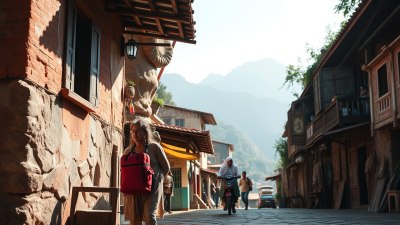How Travel Teaches You to Unlearn
Discover how travel fosters personal growth through unlearning experiences and cultural immersion.

Image created with Flux Schnell
Travel is more than just a means to explore the world; it's a transformative journey that encourages us to unlearn preconceived notions, biases, and ways of thinking. The act of traveling immerses us in different cultures, perspectives, and experiences, prompting a reevaluation of our beliefs and assumptions. In this article, we will delve into how travel serves as a catalyst for unlearning and personal growth.
The Concept of Unlearning
Before examining how travel facilitates unlearning, it's essential to understand what unlearning means. Unlearning is the process of discarding habitual patterns of thinking and behavior that no longer serve us. It's about challenging our established beliefs and being open to new ideas. Often, we are shaped by our environment, education, and experiences, which can lead to rigid thinking. Unlearning is a conscious effort to step outside our comfort zones and reassess our understanding of the world.
Traveling places us in diverse situations that disrupt our daily routines and expose us to unfamiliar ways of living. This disruption is crucial; it nudges us to reconsider what we think we know. Whether it's engaging with locals, tasting new cuisines, or navigating different social norms, travel urges us to question our assumptions about life.
Cultural Exposure: The Heart of Unlearning
When we travel, we are often thrust into cultures that differ significantly from our own. This exposure can be a profound unlearning experience. For instance, consider the various ways different societies approach education, family dynamics, and community values. In some cultures, communal living is preferred, while in others, individuality is paramount. By immersing ourselves in these different cultural practices, we begin to see the limitations of our own worldview.
For many travelers, visiting a country like Japan can be a revelation. From the meticulous attention to detail in service to the concept of 'Omotenashi'—selfless hospitality—one may unlearn the often rude or rushed demeanor that characterizes interactions in some Western cultures. This exposure encourages us to reflect on our behaviors and the impact they have on our surroundings.
Challenge Your Comfort Zone
One of the most significant aspects of travel is the inherent challenge it presents. Stepping outside of our comfort zones often leads to discomfort, which can be a powerful catalyst for unlearning. For instance, learning to navigate a foreign city, booking accommodations in a language you do not speak, or bargaining at a local market—each of these experiences forces us to adapt and let go of preconceived ideas about efficiency, communication, and even social interaction.
Traveling alone can amplify this effect. Solo travelers must rely on themselves, interact with strangers, and handle unforeseen challenges. These experiences can shatter the illusion of independence held by many and highlight the importance of community and interdependence in our daily lives.
Introspection and Self-Discovery
Travel offers opportunities for introspection that are often hard to find in our daily lives. Away from daily distractions, we can explore our thoughts, feelings, and beliefs. This introspective journey can lead to profound realizations and a reevaluation of who we are. As we explore new places, we may find parallels with our own experiences, leading us to question why we think and act the way we do.
For instance, a traveler may visit a developing country and witness the resilience of its inhabitants living with minimal resources. This encounter can challenge preconceived notions about poverty, success, and happiness. Witnessing a family thrive under challenging circumstances might lead to the unlearning of the belief that happiness is inherently tied to material wealth.
Embracing Impermanence
One of the valuable lessons learned through travel is the acceptance of impermanence. In many cultures, there is a strong emphasis on enjoying the moment and acknowledging that life is transient. This perspective can drastically alter one's approach to planning, stability, and security. Travelers often encounter beautifully fleeting experiences—a night under the stars in a remote desert, a sunset over a bustling city, or a brief encounter with a local sharing their life story.
Through such experiences, we can unlearn the importance of material possessions, rigid plans, and structured lives. These moments teach us the value of being present and appreciating the now, encouraging a more flexible and open-minded approach to life.
Redefining Success and Happiness
Travel not only exposes us to diverse cultures but also to different interpretations of success and happiness. In our societies, there are often predefined metrics—like wealth, status, and career achievements—that dictate our understanding of success. By visiting places where community, family ties, or a simple lifestyle are prioritized, we may start to unlearn these narrow definitions.
Take the example of a traveler visiting Scandinavian countries, which consistently rank high on happiness indexes. It's not necessarily the wealth of individuals but rather their strong social support systems, work-life balance, and community engagement that contribute to their happiness. By experiencing this, travelers can unlearn the notion that success is solely tied to career ambition or financial gain.
The Need for Empathy
Traveling opens doors to empathy. Engaging with people from diverse backgrounds teaches us to see the world through different lenses, fostering a deeper understanding of their experiences, struggles, and triumphs. This continued exposure combat prejudice and dismantles stereotypes that we may unknowingly carry.
For instance, someone who travels to refugee camps or impoverished neighborhoods may encounter stories and truths that challenge their previously held biases. Conversations with those whose lives differ greatly from our own can unveil the complexities of social issues and shatter simplistic narratives. Learning to listen and truly empathize is one of travel's most critical unlearning lessons—encouraging us to fight against judgment and ultimately promoting a more inclusive worldview.
Language and Communication
Language is a powerful tool that shapes how we think and perceive the world. Travelling to places where we do not speak the language can be an unlearning experience in itself. It forces us to rely on non-verbal communication, gestures, and the art of listening more intently. This can lead to a greater understanding of the ways we communicate and express ourselves and the underlying thoughts conveyed by body language and tone.
Additionally, learning key phrases in another language can lead to deeper connections with locals, enhancing cross-cultural interactions and allowing us to engage in more meaningful exchanges. It emphasizes that understanding transcends spoken language and encourages the unlearning of simplistic views regarding language and intelligence.
The Role of Nature
Nature has a unique ability to teach us valuable life lessons often overshadowed by the hustle and bustle of modern living. Traveling to remote locations, national parks, or serene landscapes can evoke feelings of peace and clarity, prompting us to confront existential questions about our purpose, priorities, and the essence of happiness. In nature, we learn to appreciate minimalism, patience, and interconnectedness. Spending time in the great outdoors can unlearn habits of consumption and instant gratification that dominate our fast-paced society.
A hiker atop a mountainous peak may find that the view, the fresh air, and the moment of stillness bring a sense of fulfillment that material possessions could never provide. This realization can drive individuals to simplify their lives and prioritize experiences over possessions, fostering a mindset that values what truly matters.
Travel ultimately teaches us to unlearn the rigid frameworks through which we often view the world. By challenging our assumptions, embracing diverse cultures, and reflecting on our experiences, we can expand our perspectives and cultivate empathy. Unlearning is an ongoing journey, one that continues to evolve with every new destination we explore. So, whether you're embarking on a trek across a foreign land or simply exploring your local community, remember: each experience brings the potential for unlearning and growth. Open your heart and mind, and let travel transform you into a more enlightened, understanding human being.











